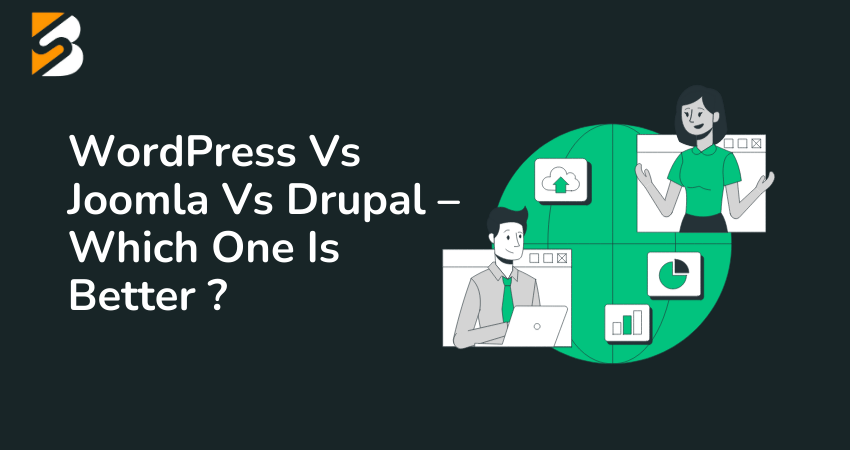In the battle of content management systems (CMS), three major players stand out: WordPress, Joomla, and Drupal. When it comes to building websites, content management systems (CMS) play a crucial role in providing flexibility, functionality, and ease of use. They are all used for CMS web development in Ahmedabad and other cities around the world.
Introduction of Content Management System
WordPress
WordPress is the most popular CMS in the world, powering over 39.5% of all websites. It is known for its ease of use, flexibility, and large community of developers and users. WordPress is a good choice for a wide range of websites, from simple blogs to complex e-commerce stores.
Joomla
Joomla is another popular CMS, powering over 3% of all websites. It is known for its power and flexibility, making it a good choice for large and complex websites. Joomla is also a good choice for multilingual websites.
Drupal
Drupal is the most complex of the three CMS platforms, but it also offers the most power and flexibility. Drupal is a good choice for large and complex websites, as well as websites that need to handle a lot of content.
WordPress vs Joomla vs Drupal Comparison
They all offer a wide range of features and functionality, making them suitable for a variety of websites. However, there are some key differences between the three platforms that can make one a better choice for your specific needs.
Ease of Use and User-Friendliness
When it comes to ease of use and user-friendliness, WordPress takes the lead. With its intuitive interface and straightforward setup process, even beginners can quickly get a website up and running. The platform offers a vast library of themes and plugins, allowing users to customize their websites without any coding knowledge. The WordPress community is also extensive, providing abundant support and resources for users at all levels of expertise.
Joomla follows closely in terms of user-friendliness but requires a slightly steeper learning curve compared to WordPress. While its administration interface may seem more complex, it offers greater control over website design and structure. Joomla is a suitable choice for those who want more flexibility and are willing to invest time in learning the system.
On the other hand, Drupal has a reputation for being the most complex of the three CMS platforms. It requires technical expertise and familiarity with coding to fully leverage its power. Drupal’s learning curve may deter beginners, but for experienced developers, it offers unparalleled flexibility and customization options.
Scalability and Flexibility
When it comes to scalability and flexibility, Drupal shines as the top choice. Its modular architecture allows developers to build highly complex and customizable websites. Drupal’s robust content management capabilities, extensive API support, and excellent security features make it ideal for large-scale enterprise websites, government portals, and educational institutions. Drupal can handle massive amounts of content and traffic, making it a reliable option for organizations with specific and demanding requirements.
Joomla also offers scalability and flexibility, although not as extensively as Drupal. It is suitable for medium to large-sized websites, e-commerce platforms, and community-based portals. Joomla’s built-in features and extensions provide a good balance between out-of-the-box functionality and the ability to customize and expand as needed.
WordPress, while not as powerful as Drupal or Joomla in terms of scalability, is still capable of handling medium-sized websites and blogs. However, it may face performance limitations when dealing with large amounts of content and high traffic volumes. For smaller websites and personal blogs, WordPress is an excellent choice due to its simplicity and wide range of themes and plugins.
Community Support and Resources
WordPress enjoys the largest and most active community of the three CMS platforms. Its popularity has led to a vast ecosystem of themes, plugins, and resources readily available for users. The WordPress community offers extensive documentation, forums, and online tutorials, making it easy to find answers to any questions or problems that may arise. This strong community support contributes to WordPress’s accessibility and user-friendly nature.
Joomla also has a thriving community, although not as large as WordPress’s. It offers an array of templates, extensions, and forums where users can seek assistance and share knowledge. Joomla’s community support may not be as extensive as WordPress, but it is still reliable and helpful.
Drupal, while having a smaller community compared to WordPress and Joomla, boasts a passionate and dedicated user base. Drupal’s community is known for its technical expertise and provides valuable resources, documentation, and support through forums and specialized websites. Developers and experienced users can find robust solutions and share insights within the Drupal community.
Use Cases and Target Audience
WordPress, with its simplicity and user-friendliness, is well-suited for individuals, small businesses, bloggers, and content-driven websites. It is the go-to choice for beginners or those who want to set up a website quickly and easily.
Joomla is a versatile CMS that finds its strength in e-commerce websites, social networks, and community-based platforms. It offers more control over website design and structure, making it suitable for medium to large-sized websites that require specific functionalities.
Drupal is the CMS of choice for complex enterprise-level websites, government portals, and educational institutions. It provides powerful content management capabilities, flexibility, and scalability. Drupal is ideal for those with advanced technical skills and specific requirements.
Which One Is Right for You?
The best CMS for you will depend on your specific needs and requirements. If you are looking for a CMS that is easy to use and has a wide range of themes and plugins, then WordPress is a good choice. If you need a CMS that is powerful and flexible, then Joomla or Drupal may be a better option.
Conclusion
WordPress, Joomla, and Drupal are all excellent CMS platforms. The best choice for you will depend on your specific needs and requirements. If you are not sure which platform is right for you, I recommend starting with WordPress. It is the easiest to use and has a wide range of themes and plugins to choose from. Once you have more experience, you can then consider Joomla or Drupal if you need a more powerful and flexible CMS.



